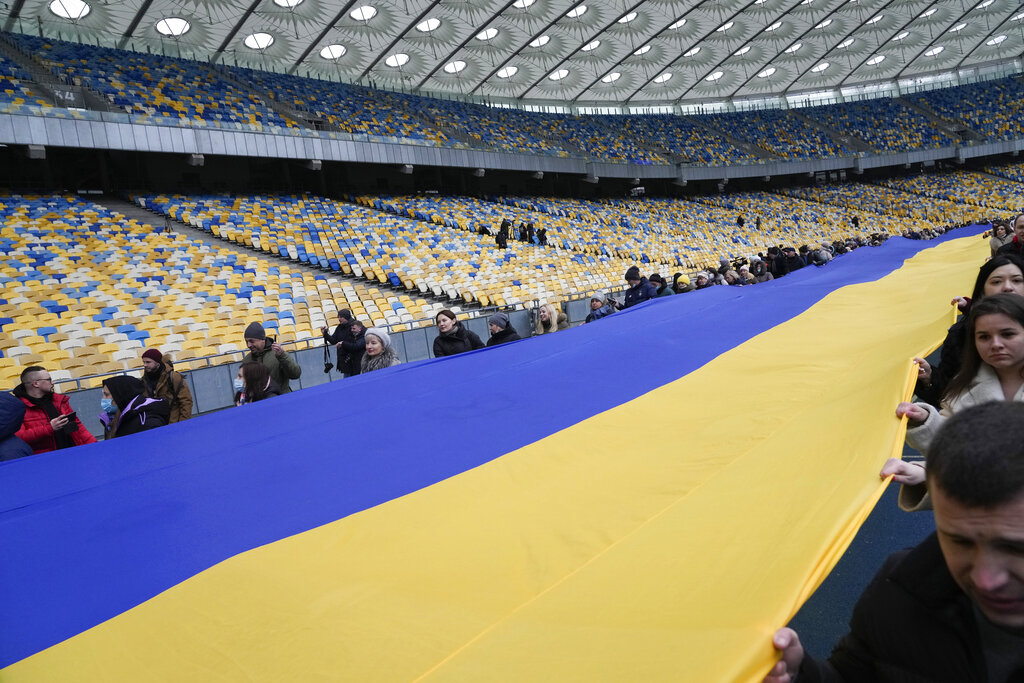Whether President Joe Biden is leading from behind on Ukraine or merely lagging behind is an open question.
Biden and his administration keep trying to catch up to where others were a month earlier or a day before. By which time, they’re behind again. The president’s vacillation is the result of a generation-long weakening of Washington’s will to lead globally. Some of this comes from the isolationist Right, which wants America to be strong behind its frontiers but uninvolved abroad. But it is more the result of a repudiation of America’s benign strength and singular fitness by radicals who now control the Democratic Party.
Biden dare not get out of step with his base. It is a base that rejects America and its traditional role as leader of the free world. If the free world does not have a leader, there will be less freedom. That is the humiliating disaster we are watching as Russia’s President Vladimir Putin successfully challenges a decadeslong order that, however inconsistently, stood up for human rights and national self-determination.
When, on Monday, Putin officially recognized two chunks of Ukraine — the so-called Luhansk People’s Republic and the Donetsk People’s Republic — Biden’s nothing-to-see-here line of argument was that Russian armor and troops rolling westward didn’t amount to a “new step” because they were preceded by earlier Russian forces in 2014.
The administration’s weak response, having been pummeled by both Republicans and Democrats, collapsed by Tuesday, when the deputy national security adviser accepted that Putin’s action was an “invasion.” But by then, the opportunity for America to lead and look strong — to be strong — had been lost.
This fits a pattern.
When Ukrainian President Volodymyr Zelenskyy called for sharp sanctions against Russia, Secretary of State Antony Blinken at first pushed back. He deflected the request by saying sanctions cease to be a deterrent once they are used. That, surely, is untrue. If sanctions are sharp enough to deter in the first place, it is because they are painful when they actually bite. Blinken’s analysis contradicts his own assertion that if “a single additional Russian force goes into Ukraine in an aggressive way, that would trigger a swift, a severe, and a united response from us and from Europe.” So, are sanctions useful after the fact or only as a deterrent? Who knows? Apparently not the Biden administration.
Having failed the laugh test, administration claims to U.S. and European unity didn’t survive a single news cycle. Italy instantly stepped out of line about severity, saying Russian energy supplies should be exempt from sanctions even though they are Putin’s most important source of funds. Biden unilaterally disarmed in this conflict some time ago by signaling in advance that no American forces would be sent to Ukraine, that Americans stranded there would not be rescued, and that Washington might accommodate a “minor incursion.”
Democrats and Republicans used to warn the enemy that “nothing is off the table.” They didn’t semaphore to him that he need not take threats of severe consequences seriously. Putin, determined to rebuild and command the Soviet sphere of influence to whatever extent possible, has been watching and assessing Washington’s responses to his aggression, found them wanting, and acted accordingly.
But why is America faltering?
Certainly, our disastrous experience in Iraq and then the debacle of our scuttling exit from Afghanistan strained public support for overseas conflict. But waning support for American involvement in each case was not simply due to the fact that these engagements seemed never to end. Our commitments in Japan and Europe after World War Two lasted longer, and public support never flagged. The differences are many, but two important ones are that those earlier commitments were made when America was surer of itself and its role in the world and that U.S. leaders were able in consequence to articulate a coherent vision of what we were doing. A leader who could state clearly what America stands for and carry conviction could, even now, also carry public opinion with him.
That’s not who we have in the White House. The public yearns to recapture the clarity of vision with which this country was once blessed. And it wants political leaders who can express it with conviction and without demur. What we have lost more than anything is united self-belief. It has not been lost inadvertently or accidentally but has, rather, been attacked relentlessly by the Left, which rejects the very idea of America, repudiates its ideals, trashes its reputation, and does not want it to succeed.








